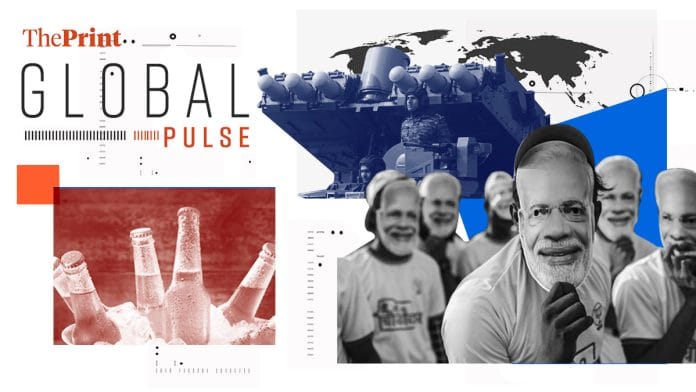New Delhi: They cannot cast absentee ballots but India’s 35-million diaspora is “heavily courted” by the country’s main political parties, reports John Yoon for The New York Times. His report talks about pro-Modi rallies and events being held across major cities in the US in the run-up to and during the course of the ongoing Lok Sabha elections.
Despite the diaspora’s marginal direct impact on Indian politics, their activities help bolster the image of global support for Modi, says the report titled ‘Millions of Indians Living Abroad Have a Say in the Election, Even if They Can’t Vote’.
It goes on to voice concerns of the diaspora about marginalisation of minorities and erosion of democratic institutions under Modi. “Independent institutions have collapsed under Modi,” it quotes New Jersey-based activist Suresh Ediga, an Indian expatriate, as saying.
In an interview for Financial Times, its correspondent Chris Kay talks to Vivek Gupta, CEO of United Breweries (Heineken’s Indian arm) about regulatory action and shifting rules in India. Gupta states that regulatory raids and shifting state laws are hindering growth and investment in India, a key market for the company. He emphasises the need for predictable regulation, underlining that United Breweries faces difficulty in launching new brands nationwide due to complex licensing systems.
In the interview titled Heineken’s India unit says raids and red tape hurt business’, Gupta also calls for “fair taxation” to make beer more affordable, criticising the current tax system’s impact on beer over spirits. “We will have to make choices if the environment is not there,” Gupta warns, stressing the importance of a supportive regulatory framework.
In an editorial titled ‘India’s election: Narendra Modi’s audacity of hate’, The Guardian discusses how Modi “encourages a belief in his divinity, leading followers to think it is God’s purpose to spread fear and loathing”.
During India’s election campaign, Modi used Islamophobic rhetoric, portraying the country’s 200 million Muslims as a threat to the Hindu majority, says the editorial, adding that this strategy distracts voters from pressing issues like high inflation and unemployment. Economic gains are concentrated among the upper castes, exacerbating inequality, it says.
Highlighting that reducing inequality has been a “feature, to his credit, of Mr Gandhi’s (Rahul Gandhi) campaign, it adds that the “trouble for India is that Mr Modi has a knack for turning anger and fear into political power”.
In an analysis for The Diplomat titled, ‘India’s Puzzled Military Industrial Complex’, Mukesh Kumar talks about how India’s diversification of arms partners has led to a trust deficit with major suppliers, who could be “reluctant to transfer the technology New Delhi requires to truly indigenize its defence industry”.
A doctoral research scholar at the Centre for International Politics, Organizations, and Disarmament (CIPOD), School of International Studies, Jawaharlal Nehru University (JNU), Kumar writes that India fell out of SIPRI’s top 25 arms exporters list for FY 2023-24, but remained the top arms importer, with imports increasing by 4.7 percent between 2014-18 and 2019-23. He adds that this was despite initiatives like Atmanirbhar Bharat.
“The increase in arms imports despite several initiatives to indigenize India’s defence industry should inspire us to re-think and re-evaluate the existing policies to plug the loopholes.”
Trump convicted, Ukraine using US-supplied weapons
Donald Trump was found guilty on all 34 counts he faced for falsifying documents to cover up a payment to silence a porn actor ahead of the 2016 election. This marks the first time a former US president has been convicted in a criminal case. To know more, read this Reuters report.
US President Joe Biden has allowed Ukraine to use some US-made weapons over one part of the Russian border, to allow Kyiv’s forces to defend against an offensive aimed at the city of Kharkiv, relaxing an important constraint on Ukraine’s ability to defend itself. To know more, read The Guardian’s report.
(Edited by Amrtansh Arora)
Also Read: Adani Group’s plans to diversify and how cricket in India is intertwined with politics






